-
About
- About Listly
- Community & Support
- Howto
- Chrome Extension
- Bookmarklet
- WordPress Plugin
- Listly Premium
- Privacy
- Terms
- DMCA Copyright
- © 2010-2025 Boomy Labs

 Beth Fahlberg
Beth Fahlberg
Listly by Beth Fahlberg
Books about death, dying, serious illness, end-of-life and palliative care issues.
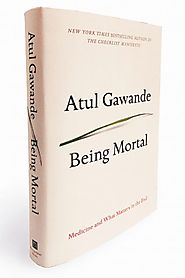
"Medicine has triumphed in modern times, transforming the dangers of childbirth, injury, and disease from harrowing to manageable. But when it comes to the inescapable realities of aging and death, what medicine can do often runs counter to what it should.
Through eye-opening research and gripping stories of his own patients and family, Gawande reveals the suffering this dynamic has produced. Nursing homes, devoted above all to safety, battle with residents over the food they are allowed to eat and the choices they are allowed to make. Doctors, uncomfortable discussing patients’ anxieties about death, fall back on false hopes and treatments that are actually shortening lives instead of improving them. And families go along with all of it.
In his bestselling books, Atul Gawande, a practicing surgeon, has fearlessly revealed the struggles of his profession. Now he examines its ultimate limitations and failures – in his own practices as well as others’ – as life draws to a close. And he discovers how we can do better. He follows a hospice nurse on her rounds, a geriatrician in his clinic, and reformers turning nursing homes upside down. He finds people who show us how to have the hard conversations and how to ensure we never sacrifice what people really care about.
Riveting, honest, and humane, Being Mortal shows that the ultimate goal is not a good death but a good life – all the way to the very end."
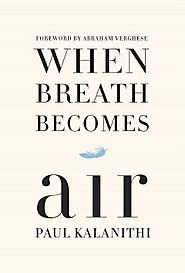
This book is a memoir that provides insight into the thoughts of a young physician who is dying.
"Paul Kalanithi’s memoir, “When Breath Becomes Air,” written as he faced a terminal cancer diagnosis, is inherently sad. But it’s an emotional investment well worth making: a moving and thoughtful memoir of family, medicine and literature. It is, despite its grim undertone, accidentally inspiring...
But Kalanithi is also one of those patients, a position that gives him special insight. “It occurred to me that my relationship with statistics changed as soon as I became one,” he writes. He ponders the times when “I had pushed discharge over patient worries, ignored patients’ pain when other demands pressed. The people whose suffering I saw, noted, and neatly packaged into various diagnoses, the significance of which I failed to recognize — they all returned, vengeful, angry, and inexorable.”...
In one of the book’s most poignant moments, Kalanithi lies on a cot in the same hospital room where his wife is giving birth to their daughter, Cady. Holding his child for the first time, he writes, “The possibilities of life emanated before us.” A few pages later, however, he is confronting yet again the certainty of death. “Everyone succumbs to finitude,” he writes. “I suspect I am not the only one who reaches this pluperfect state.” Only memory and words — in his case, those in this very book — “have a longevity I do not.”
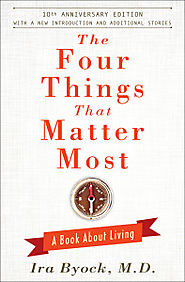
"Four simple phrases: “Please forgive me,” “I forgive you,” “Thank you,” and “I love you” — carry enormous power to mend and nurture our relationships and inner lives. These four phrases and the sentiments they convey can help us resolve interpersonal difficulties with integrity and grace.
In The Four Things That Matter Most, Dr. Ira Byock, an international leader in palliative care, explains how we can practice these life-affirming words in our day-to-day lives and improve our emotional well-being. He demonstrates the value of “stating the obvious” in letting the people we love know that we love them and provides practical insights into the benefits of letting go of old grudges and toxic emotions.
Dr. Byock’s insights and stories help us to forgive, appreciate, love, and celebrate one another, enabling us to live life more fully. He also shows that, through the very end of life, surprising degrees of emotional healing are possible. We can experience a sense of wholeness even in the wake of family strife, personal tragedy, or divorce, or in the face of death.
With practical wisdom and spiritual power, The Four Things That Matter Most gives us language and guidance to honor and experience what really matters most in our lives every day."
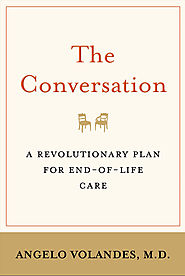
"In The Conversation, Harvard Medical School physician Angelo Volandes offers a solution that is medicine’s oldest and least technological tool in the proverbial black bag: talking. If doctors explain options—including the choice to forgo countless medical interventions that are often of little benefit in patients with advanced illness—then patients can tell doctors how they wish to spend the remainder of their lives.
Through the stories of seven patients and seven very different end-of-life experiences, Volandes explores the trajectory of events and treatments that occur with and without this essential conversation."
angelovolandes.com/the-conversation/
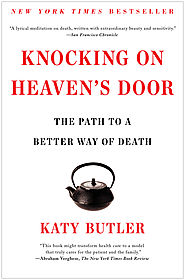
"Caring for declining parents is a reality facing millions who may someday tell a doctor an oddly loving thing: “Let my parent go.” This revolutionary blend of memoir and investigative reporting points the way to a new art of dying for our biotechnical age. Like Jessica Mitford’s The American Way of Death and Sherwin Nuland’s How We Die, it is sure to change the national conversation."
katybutler.com/site/knocking-on-heavens-door/
